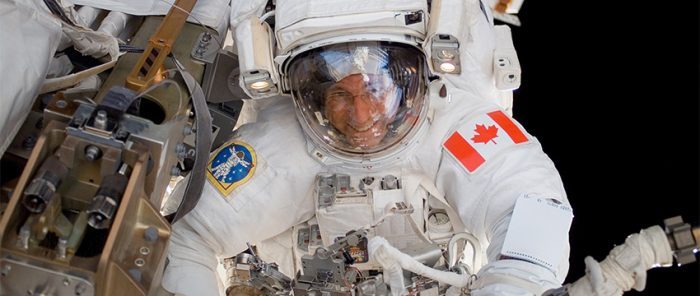Brenda Branswell, McGill News
Growing up in the 1960s, Dave Williams was intrigued by outer – and inner – space.
He would watch The Undersea World of Jacques Cousteau spellbound, then put on a facemask “and engage in snorkel exploration of the six-inch depths of the bathtub,” Williams writes in his new memoir Defying Limits: Lessons from the Edge of the Universe.
Williams would later visit both locations as a Canadian astronaut and aquanaut. He travelled to space in 1998 aboard space shuttle Columbia, and in 2007 on Endeavour. He also went on two underwater missions to Aquarius, the undersea research laboratory, off the coast of Florida.
“I was very fortunate to explore the two final frontiers,” says Williams, BSc’76, MDCM’83, MSc’83, DSc’07.
“It was just remarkable to think that my dream of becoming an explorer and exploring underwater and exploring space would actually come true.”
Williams wrote four children’s books before tackling his memoir.
“I started out with the kids’ books because I really wanted to provide kids with inspirational material that would help foster their passion for science, technology, engineering, and math,” without actually saying those STEM nouns, Williams says.
He was initially reluctant to write a memoir when his editors suggested the idea, thinking it was already a crowded biography space among former astronauts. However, he has tried to offer a different perspective.
“Yes, it is about flying in space, but … what we are trying to convey in the book is the important perspective that we develop upon our planet by seeing the Earth from such a unique perspective, and thinking about how that perspective affects all of us when we are in times of difficulty in our lives.”
Williams, who lives in Oakville, Ont., grew up on Montreal’s West Island and became a certified scuba diver at 13.
He writes about how failure is more instructive than success and recounts how he failed a presentation that would have allowed him to go directly into a PhD program at McGill. Williams vowed to get the best mark in a compulsory physiology exam for master’s and PhD students in the program. He came out on top and went on to medical school at McGill.
“I learned that it’s what you do when you don’t succeed that determines whether you will one day succeed,” Williams writes later in the book, adding he won the Wood Gold Medal as the top clinical student when he graduated from McGill’s medical school and the psychiatry prize.
Williams was director of the emergency department at Sunnybrook Hospital in Toronto in 1992 when he was selected as one of Canada’s four new astronauts out of an original pool of more than 5,300 applicants. He recounts the rigorous training he underwent with the Canadian Space Agency and NASA, including flying in a KC-135, aka ‘Vomit Comet’, which creates moments of weightlessness through rollercoaster-type maneuvers.
He also shares his experience of being diagnosed with prostate cancer, and then flying to space in 2007 as a cancer survivor. It was during that mission that Williams performed three spacewalks.
“It was pretty incredible being able to do it,” he says. “With spacewalking, it’s kind of like skydiving in a way. It’s hard to train for, and even though we train underwater and you go through all the tasks, you never really know how you’re going to do when the hatch opens and you have to go do it for real.”
It’s not a natural act, he acknowledges, going outside into the vacuum of space and looking at the Earth so far beneath you. “There is no question that it’s scary.”
By the third spacewalk, you are much more relaxed, Williams says.
“You have to imagine this: you’re out in the vacuum of space, you’re working away, you’ve got this spectacular view of the planet and Houston calls you and says, “Take a minute and enjoy the view. You are coming up to the Gulf of Mexico and Hurricane Dean is (there).”
He and fellow spacewalker Clay Anderson locked their tethers and floated freely in space looking down through the eye of the storm, and then saw the moon rising up over the Earth’s horizon. “Just unbelievable, the spectacular beauty of it,” he says.
Williams can still imagine what it’s like being in space.
“My brain, in a sense, is permanently different based on that life experience … I could be sitting in a room and have no problem at all thinking about what it would be like sitting on the ceiling looking down at the people in the room,” he says.
Even though it was about nine years between his first and second flights, when he got to space the second time, “it was like I was there yesterday. It’s a fun feeling because it’s the ultimate freedom – you push yourself off with a finger and you float alone like a superhero.”
May 16, 2019

